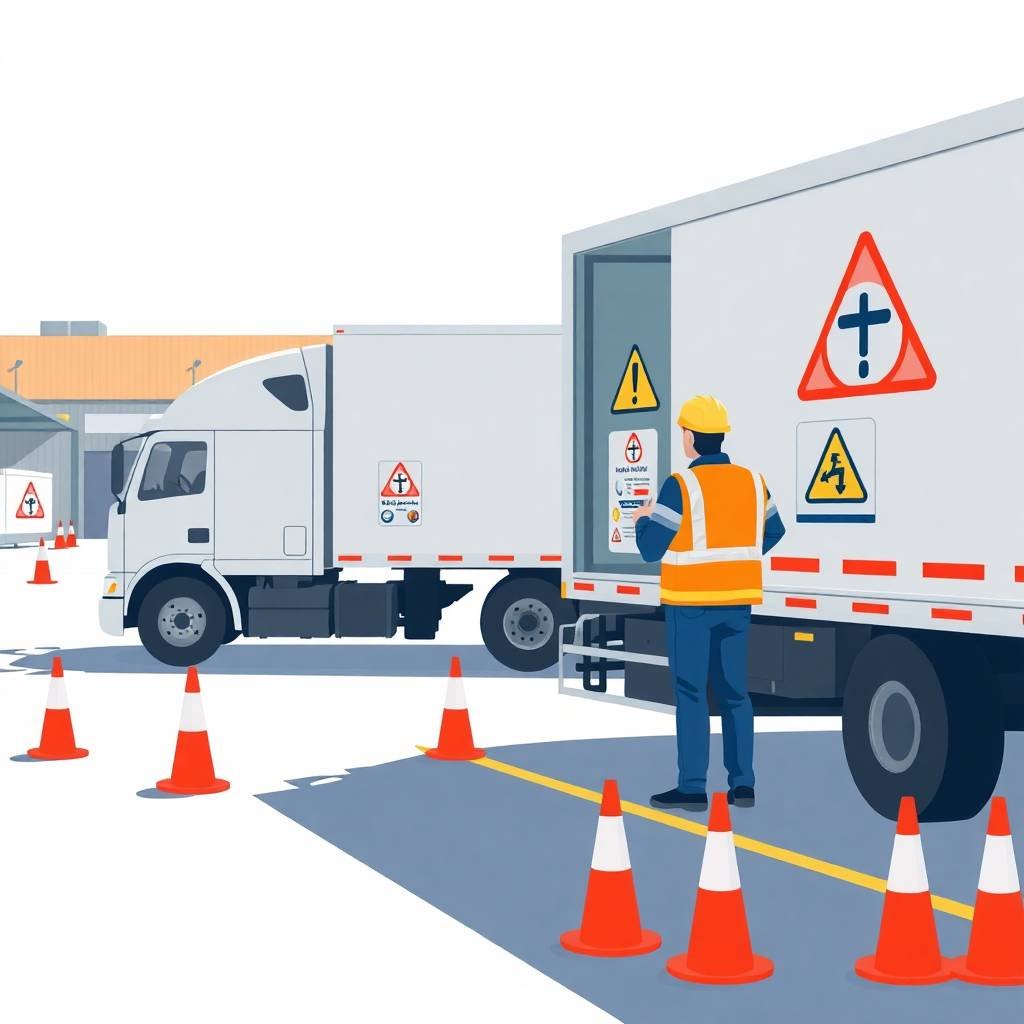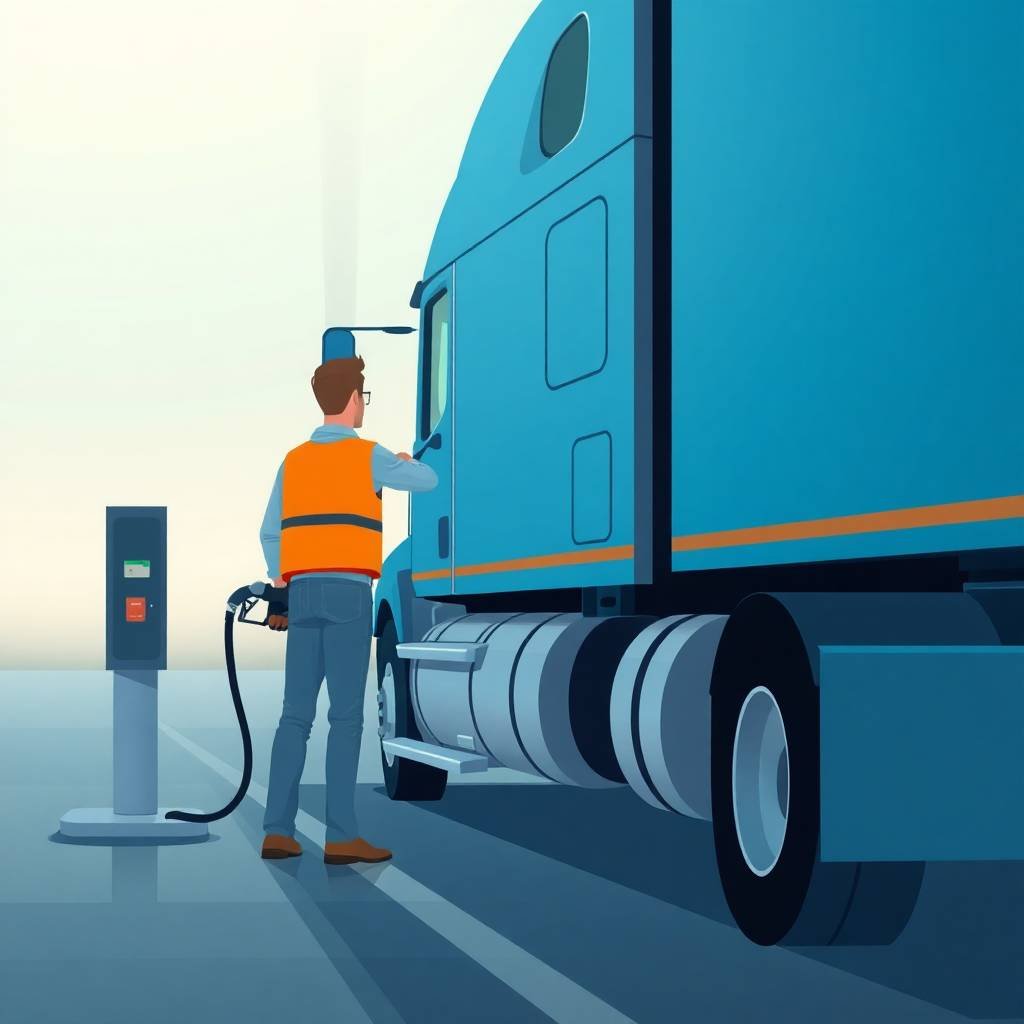1. Understand the Core FMCSA Insurance Requirements for New Carriers
Starting a trucking company comes with many compliance responsibilities, and none are more critical than understanding the FMCSA Insurance Requirements for New Carriers. These requirements are designed to ensure financial responsibility and safety across the industry. If you’re launching your authority, understanding these insurance rules is not only mandatory—it’s essential to protecting your business from costly setbacks.
Why FMCSA Insurance Requirements for New Carriers Matter
The FMCSA Insurance Requirements for New Carriers are legally mandated by the Federal Motor Carrier Safety Administration (FMCSA). Depending on your operations—such as whether you transport hazardous materials or operate interstate—the minimum liability coverage typically ranges from $750,000 to $5 million. These requirements must be met and filed via your insurer before your operating authority becomes active.
To simplify the process, it’s essential to review your FMCSA insurance filing requirements early. These filings, such as the BMC-91 or BMC-34, serve as proof of insurance on file with FMCSA.
Avoid Delays by Meeting Deadlines
Many new carriers lose precious time—and revenue—by missing key deadlines. After applying for your MC number, you have 90 days to meet the FMCSA Insurance Requirements for New Carriers. Missing this window results in your application being dismissed. Be proactive and also confirm your UCR filing deadlines to avoid registration issues.
Additionally, filing your FMCSA PIN promptly allows access to the FMCSA Portal where you can monitor your compliance status in real time.
Pair Insurance Compliance with Safety Readiness
Meeting the FMCSA Insurance Requirements for New Carriers is just one piece of the puzzle. Your insurance standing can be negatively impacted by poor safety scores or compliance violations. To maintain good standing, review your FMCSA compliance requirements for trucking companies and build systems that support ongoing compliance.
Using the FMCSA Safety Measurement System (SMS), FMCSA evaluates your safety performance. Poor scores can affect your insurance premiums and renewal eligibility. Align your efforts with solid driver qualification file requirements, drug and alcohol testing compliance, and driver logs compliance to mitigate risk.
Prepare for the New Entrant Safety Audit
All new carriers undergo a new entrant safety audit within the first 12 months of operation. Non-compliance with FMCSA Insurance Requirements for New Carriers can result in audit failure. Preparing ahead with a DOT audit preparation checklist can help you organize records and demonstrate insurance coverage, drug testing, and safety policies effectively.
Prevent Mistakes That Jeopardize Your Authority
Common mistakes—like failing to update insurance after policy changes or not understanding exemptions—can lead to revocation. Avoid these traps by studying FMCSA compliance mistakes and enrolling your team in DOT compliance training for ongoing education.
For small operations, our guide on DOT compliance for small fleets offers strategic steps to keep everything on track.
Work With Experts to Stay Compliant
Don’t navigate this process alone. A consultation with a compliance expert can help clarify the FMCSA Insurance Requirements for New Carriers and ensure all filings and documentation are in order. You can schedule your appointment here to receive personalized guidance tailored to your operation type, cargo classification, and fleet size.
By understanding and implementing the FMCSA Insurance Requirements for New Carriers, you can protect your business, improve audit outcomes, and set the foundation for long-term success. Compliance isn’t just about avoiding fines—it’s about running a safer, smarter trucking operation.

2. Choose the Right Insurance Coverage Based on Your Operation Type
Choosing the right insurance coverage is essential to fulfilling FMCSA Insurance Requirements for New Carriers. Many new entrants to the trucking industry fail to understand how their specific operation type—whether transporting general freight, hazardous materials, or operating as an owner-operator—directly impacts their insurance obligations. Selecting the wrong type or amount of coverage can delay your operating authority, raise costs, or worse, result in non-compliance penalties.
Start With the Basics: Know Your Insurance Minimums
The FMCSA Insurance Requirements for New Carriers begin with minimum liability coverage thresholds, which vary by operation type. General freight haulers need at least $750,000 in liability coverage, while hazardous materials transporters may require $5 million. Understanding the FMCSA insurance filing requirements is the first step to ensuring you have the right coverage filed correctly.
Before obtaining your authority, ensure you’ve requested your FMCSA PIN to access the FMCSA Portal, where you’ll manage these filings.
Owner-Operators Need Tailored Coverage
For owner-operators, insurance needs can differ depending on whether you operate under your own authority or lease onto a carrier. Refer to this DOT compliance checklist for owner-operators to assess what coverages apply. Most owner-operators must meet both liability and cargo insurance minimums and may benefit from physical damage or bobtail insurance depending on how they operate.
Match Coverage to Operational Risk
The FMCSA doesn’t take a one-size-fits-all approach, and neither should you. If you transport hazmat, review this DOT hazmat compliance overview to understand your added responsibilities, which will affect insurance costs and requirements. Don’t forget that certain FMCSA hours of service exemptions may apply to your operation type, but won’t exempt you from the proper insurance filings.
Ensure Safety and Compliance Alignment
Your insurance costs and eligibility are affected by how well you maintain safety standards. Poor SMS scores can increase premiums. Stay in compliance with tools like the FMCSA Safety Measurement System (SMS) and keep accurate driver qualification files.
Don’t overlook your drug and alcohol testing compliance obligations, which directly impact your ability to pass audits and meet overall FMCSA compliance requirements for trucking companies.
Plan Ahead for Your New Entrant Safety Audit
All new carriers must pass the new entrant safety audit within 12 months. Your insurance documentation will be reviewed during this process. Use this DOT audit preparation guide to ensure you’re ready and avoid common FMCSA compliance mistakes that result in failed audits.
Don’t Miss Important Filing Deadlines
Insurance coverage isn’t the only piece of compliance. Stay on top of your UCR filing deadlines and biennial update requirements to maintain your authority. Many new carriers are caught off guard by these timelines, resulting in preventable disruptions.
Get Professional Help Choosing the Right Policy
Navigating the FMCSA Insurance Requirements for New Carriers can feel overwhelming. If you’re unsure how your operation type impacts coverage needs, schedule your appointment here for tailored guidance. Our experts will walk you through your options based on your cargo, region, fleet size, and risk profile.
Getting the right insurance in place is more than a regulatory checkbox—it’s the foundation for a safe, successful, and compliant trucking business. Make smart choices now to protect your authority for the long haul.

3. Avoid Common Pitfalls When Meeting FMCSA Insurance Requirements for New Carriers
Meeting the FMCSA Insurance Requirements for New Carriers is a critical step to launching a compliant and successful trucking operation. However, many new entrants make costly mistakes during this process—errors that can delay authority approval, trigger audits, or increase financial risk. By understanding the most common pitfalls and taking proactive steps to avoid them, new carriers can protect their operations from unnecessary setbacks.
Misunderstanding Coverage Minimums Based on Operation Type
One of the most common mistakes made by new carriers is selecting the wrong level or type of insurance. The FMCSA Insurance Requirements for New Carriers vary depending on cargo type and operation. For instance, general freight operations typically require $750,000 in liability coverage, while hazmat carriers need up to $5 million.
If you’re unsure about your required coverage levels, refer to the FMCSA insurance filing requirements or consult with an expert. To receive personalized guidance, schedule your appointment here and get help selecting insurance tailored to your operation.
Delays in Filing Insurance With the FMCSA
Having the correct insurance policy is just one part of compliance—timely filing is equally important. Your insurer must file your BMC-91 or BMC-91X with the FMCSA before your operating authority can be granted. Missing this step delays your start date and may impact your new entrant safety audit timeline.
To avoid this, make sure your provider understands the requirements and that your FMCSA PIN has been secured to monitor your filings through the FMCSA Portal.
Overlooking Other FMCSA Compliance Requirements
Insurance is just one piece of a larger compliance puzzle. Failing to meet other requirements—such as Unified Carrier Registration (UCR) or driver qualification file setup—can compound your risk of violations.
Start by reviewing the DOT compliance checklist for owner-operators and ensure you’re addressing all areas, including drug and alcohol testing compliance and DVIR compliance.
Failing to Prepare for the New Entrant Audit
Every new carrier will face an audit within 12 months of operation. During this process, auditors review your insurance filings and supporting documentation. Use the DOT audit preparation checklist to ensure you’re ready, and avoid the common FMCSA compliance mistakes that result in audit failures.
Not Monitoring SMS Scores Post-Startup
After insurance is filed and operations begin, your performance data feeds into the FMCSA Safety Measurement System (SMS). High violations or unsafe behavior will increase your insurance rates and risk profile. Stay on top of driver logs compliance and training requirements using tools like the DOT compliance training for drivers to mitigate these risks.
Stay Informed and Supported
Navigating the FMCSA Insurance Requirements for New Carriers doesn’t have to be overwhelming. By learning from others’ mistakes, monitoring your filings, and aligning with broader compliance protocols, you can avoid disruptions and fines. For expert help, tailored support, and comprehensive compliance tools, turn to the FMCSA compliance requirements for trucking companies resources and schedule a consult today.

4. Work With a Specialized Insurance Provider Who Knows FMCSA Rules
Choosing the right insurance partner is more than just finding the lowest premium—it’s about protecting your business, meeting federal mandates, and setting yourself up for long-term success. For new entrants, understanding and meeting FMCSA Insurance Requirements for New Carriers can be overwhelming. That’s why working with a specialized insurance provider who knows FMCSA rules is essential.
Why FMCSA Expertise Matters for Insurance Providers
FMCSA regulations are detailed, frequently updated, and critical to securing your authority. A provider familiar with FMCSA Insurance Requirements for New Carriers will not only help you select the correct policy type but also ensure filings are submitted properly and on time.
For instance, insurance must be filed electronically with the FMCSA using Form BMC-91 or BMC-91X. Any delay or error in this process can hold up your authority, impact your new entrant safety audit timeline, and even trigger compliance reviews.
If you need guidance choosing an FMCSA-compliant policy or ensuring proper filings, schedule your appointment today to speak with a compliance-focused insurance expert.
Aligning Insurance With Your Operation Type
Not all carriers require the same insurance coverage. For example, hazardous material transporters often require up to $5 million in liability, while general freight may need just $750,000. A specialized provider understands these distinctions and ensures your insurance matches your business operations and complies with FMCSA insurance filing requirements.
Additionally, your provider should advise you on related filings such as the Unified Carrier Registration (UCR) and FMCSA Biennial Update, which are often overlooked by general insurance agents unfamiliar with trucking regulations.
Minimize Risk by Addressing Other Compliance Areas
Insurance is one aspect of the broader FMCSA compliance framework. A knowledgeable provider will point you toward resources for other crucial requirements, like driver qualification file setup, drug and alcohol testing compliance, and DOT compliance training for drivers.
When paired with a strong internal process and tools like the DOT compliance checklist for owner-operators, this holistic approach minimizes your exposure to violations.
Avoid Common Insurance-Related Compliance Mistakes
One of the biggest missteps is selecting a provider who doesn’t understand how your insurance data impacts your FMCSA Safety Measurement System (SMS) scores. A mistake here can lead to increased scrutiny, higher premiums, and failed audits.
Use the DOT audit preparation guide to align your insurance documentation with other safety and compliance areas. Avoid the common compliance mistakes that put new carriers at risk.
Partner for Long-Term Success
The right insurance provider doesn’t just help you get started—they support you as your operation grows. Whether you expand your fleet, take on new types of cargo, or operate across state lines, your insurance needs will evolve. A specialized partner ensures your coverage always reflects your risk and keeps you in step with FMCSA compliance requirements for trucking companies.
For complete confidence in your compliance from day one, connect with a team that understands the intricacies of FMCSA Insurance Requirements for New Carriers. Begin your journey with a strategic, informed approach by scheduling your free consultation now.

5. File the Correct Insurance Forms Directly With the FMCSA
Understanding and fulfilling the FMCSA Insurance Requirements for New Carriers is one of the most critical steps in launching a compliant and operational trucking company. A key part of this process involves filing the correct insurance forms directly with the FMCSA—failure to do so can delay your authority, lead to unnecessary violations, or result in costly delays during audits.
Why Filing Correct Insurance Forms Matters
The FMCSA requires specific insurance filings to activate your operating authority. Most new carriers must submit either Form BMC-91 or BMC-91X for public liability insurance. If you’re transporting household goods, you’ll also need Form BMC-34 for cargo insurance. These forms are not submitted by the carrier directly—they must be filed by your insurance provider, which makes choosing a knowledgeable partner essential.
Incorrect or delayed submissions are among the top FMCSA compliance mistakes new carriers make. These errors can affect your new entrant safety audit timeline and hinder your ability to meet federal deadlines. That’s why it’s vital to work with an expert. You can schedule a free consultation to get help understanding your filing requirements and timelines.
Matching Coverage to FMCSA Insurance Requirements for New Carriers
Different operation types require different coverage levels. For instance, interstate for-hire carriers of non-hazardous freight must maintain at least $750,000 in liability insurance, while hazardous material haulers may need up to $5 million. Filing the correct form with accurate liability amounts is vital for satisfying FMCSA insurance filing requirements.
To stay compliant with broader regulatory standards, reference the FMCSA compliance requirements for trucking companies. These standards often intersect with insurance compliance, particularly during DOT audits and inspections.
Avoid Delays by Verifying Every Compliance Step
Before your insurance is filed, ensure that you’ve completed other key compliance items. These include obtaining a PIN from the FMCSA to access your portal, registering for the Unified Carrier Registration (UCR), and submitting your biennial update.
You’ll also want to be proactive with internal compliance. Use a DOT compliance checklist for owner-operators to stay organized and check that you have everything in place, including your driver qualification files and drug and alcohol testing program.
Filing Is Just One Piece of the Puzzle
Insurance filings are a foundation, but to truly meet the full scope of FMCSA Insurance Requirements for New Carriers, you need to consider your SMS scores, audit readiness, and ongoing operational compliance. The FMCSA Safety Measurement System (SMS) 2025 outlines how compliance violations—including insurance missteps—can impact your safety scores.
New carriers should also stay prepared for audits by reviewing the DOT audit preparation guide for 2025 and using tools such as the DOT safety compliance checklist. Missing even one form or deadline could affect your audit outcome.
Stay Ahead With Trusted Support
When it comes to FMCSA Insurance Requirements for New Carriers, every detail counts. Avoid last-minute issues by partnering with experts who understand federal requirements and ensure your insurance filings are submitted accurately and on time. Don’t risk your operating authority—book your consultation today to start off right.

6. Plan for Ongoing Insurance Updates and FMCSA Monitoring
Meeting the FMCSA Insurance Requirements for New Carriers isn’t a one-time event—it’s an ongoing responsibility. From initial filings to periodic updates and consistent monitoring, new trucking companies must maintain compliance year-round. Failure to do so can lead to fines, delayed renewals, and even revocation of operating authority.
Understand Your Ongoing Insurance Responsibilities
After your initial insurance forms are filed with the FMCSA, you must ensure that your coverage remains active and properly reflects your business operations. Any changes—such as vehicle additions, carrier type modifications, or increased cargo value—may require insurance updates. These changes must also be submitted via the appropriate FMCSA insurance filing requirements to avoid any lapses in compliance.
Because FMCSA Insurance Requirements for New Carriers can be complex, it’s smart to work with professionals who understand your obligations. You can schedule a consultation to ensure your coverage is always aligned with regulatory standards and operational changes.
Incorporate Monitoring into Your Compliance Routine
The FMCSA continuously monitors carrier safety and compliance through its Safety Measurement System (SMS) 2025. Insurance lapses or coverage inconsistencies can negatively impact your SMS scores, triggering inspections or audits.
Be proactive by incorporating the DOT compliance checklist for owner-operators into your routine reviews. This tool helps ensure your insurance status aligns with other compliance areas, including drug and alcohol testing requirements and driver qualification files.
Don’t Overlook Filing Deadlines and FMCSA Updates
Insurance isn’t the only ongoing requirement. Carriers must complete the FMCSA biennial update every two years—even if no changes have occurred. Failing to file this update can deactivate your DOT number.
Additionally, remember to meet UCR filing deadlines and maintain compliance with the Unified Carrier Registration requirements.
To streamline all updates and filings, ensure you’ve completed your FMCSA portal registration and understand the FMCSA PIN request process.
Stay Prepared for Audits and Inspections
Proper insurance documentation is a focal point of the DOT audit preparation process. New carriers, in particular, will be reviewed during their new entrant safety audit. If your insurance isn’t up to date or properly documented, you risk failing the audit.
Avoid common FMCSA compliance mistakes by integrating regular internal reviews. If you’re managing a small fleet, these reviews are even more critical, since a single violation can disproportionately impact your business.
Build a Strategy for Long-Term Success
Complying with FMCSA Insurance Requirements for New Carriers doesn’t stop once your authority is granted. It’s an evolving responsibility that should be supported by ongoing monitoring, timely filings, and strategic oversight.
Use compliance tools such as the DOT safety compliance checklist, stay educated through driver compliance training, and understand related issues such as CDL disqualification rules and hours of service exemptions.
For help creating a sustainable insurance and compliance strategy, book your consultation today and stay ahead of your FMCSA responsibilities.

7. Align Your Insurance With Other Compliance Requirements to Avoid Fines
Meeting FMCSA Insurance Requirements for New Carriers is more than just submitting forms—it’s about ensuring that your insurance strategy is fully aligned with broader compliance obligations. Failing to integrate these requirements can result in fines, failed audits, or worse, loss of operating authority. That’s why a proactive approach to insurance and FMCSA compliance is essential for every new carrier.
Understand the Scope of FMCSA Insurance Compliance
Many carriers mistakenly assume that once they’ve met the FMCSA insurance filing requirements, they’re in the clear. However, insurance must be coordinated with several ongoing regulations including driver qualification file requirements and drug and alcohol testing compliance. For example, any changes to your fleet size, vehicle types, or operations can impact your insurance needs—so it’s critical to keep your filings updated.
Integrating these updates with your FMCSA biennial update requirements is a strategic way to avoid discrepancies that can raise red flags during audits or DOT inspections.
Coordinate with FMCSA Safety and Audit Requirements
The FMCSA closely monitors safety through tools like the Safety Measurement System (SMS) 2025. Inconsistencies between your insurance coverage and actual operations can negatively affect your scores. Pairing insurance planning with your DOT safety compliance checklist helps ensure all systems are synchronized.
Moreover, new carriers should prepare for the new entrant safety audit, where misaligned insurance and compliance documents are commonly flagged. Use resources like the DOT audit preparation checklist to identify gaps early.
Leverage Tools and Training to Prevent Mistakes
Mistakes in insurance compliance are among the top FMCSA compliance mistakes made by new carriers. Many of these errors stem from not understanding how insurance integrates with UCR filing deadlines, DOT Hazmat compliance, or hours of service exemptions.
Ongoing education and resources, such as DOT compliance training for drivers and your owner-operator compliance checklist, can help your team understand how each piece of the compliance puzzle fits together.
Build an Integrated Compliance Strategy
To stay compliant, use your FMCSA portal registration to regularly monitor and update your information. Synchronize this with your internal reviews of driver logs, DVIR documentation, and ELD device requirements.
If you manage a small fleet, aligning insurance with compliance becomes even more critical, as fewer resources mean less room for error. Be sure to verify that all insurance filings are consistent with your FMCSA PIN request process and that there are no conflicts with CDL disqualification rules.
Get Professional Help With Compliance Integration
Staying compliant with FMCSA Insurance Requirements for New Carriers requires more than just an insurance policy—it demands an integrated strategy that addresses every regulatory angle. Don’t navigate this alone. Schedule a personalized consultation today to develop a coordinated plan that ensures your insurance and compliance efforts work together to protect your authority and bottom line.

What are the minimum FMCSA Insurance Requirements for New Carriers to start operating legally?

The FMCSA Insurance Requirements for New Carriers mandate a minimum of $750,000 to $5 million in liability coverage depending on the type of freight you haul, and additional requirements such as cargo insurance for certain operations. Failing to meet these insurance minimums can delay or revoke your operating authority. To streamline the process and avoid compliance issues, we recommend reviewing your DOT audit preparation plan alongside your insurance filings.
When do FMCSA Insurance Requirements for New Carriers need to be submitted during the registration process?

You must meet the FMCSA Insurance Requirements for New Carriers and have your insurer file proof of insurance (e.g., BMC-91, BMC-34) within 90 days of applying for your operating authority. Missing this deadline will result in dismissal of your application. It’s also important to align your filings with UCR requirements to ensure your registration remains valid.
Can I operate without cargo insurance under the FMCSA Insurance Requirements for New Carriers?

Cargo insurance is not mandatory for all carriers under FMCSA Insurance Requirements for New Carriers, but it’s required for household goods movers and often requested by shippers and brokers. Operating without it could severely limit your contracts. Additionally, maintaining compliance across your fleet — including driver qualification file monitoring — helps reduce insurance risk and improve audit outcomes.
How do the FMCSA Insurance Requirements for New Carriers affect my DOT audit risk?

Insurance coverage plays a key role in your DOT audit. If your filings are incorrect or coverage is inadequate, it could trigger an automatic compliance failure. Understanding FMCSA Insurance Requirements for New Carriers and aligning them with broader programs like drug and alcohol testing management is essential to passing audits and avoiding fines.
What additional filings are necessary alongside FMCSA Insurance Requirements for New Carriers?

In addition to insurance filings, new carriers are responsible for submitting BOC-3 forms, IFTA/IRP registrations, and maintaining accurate UCR records. These filings work together with FMCSA Insurance Requirements for New Carriers to form a complete compliance portfolio. For full support in managing these documents, check out our IFTA, IRP & BOC-3 assistance services.
Igor Iturriaga is a transportation compliance expert and founder of Dynamic 305 Miami LLC. He helps owner-operators and fleets stay FMCSA-compliant and audit-ready. https://www.linkedin.com/in/igor-iturriaga-64503217/
